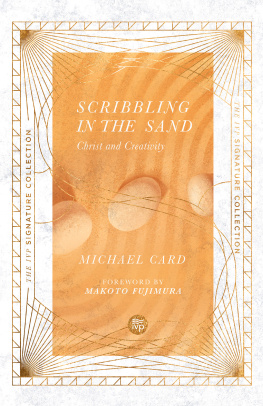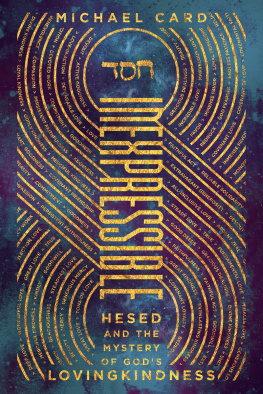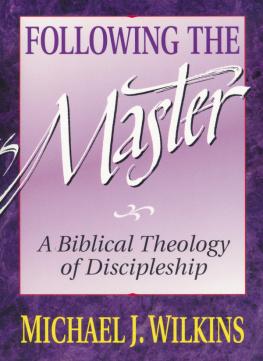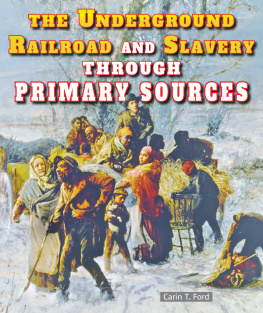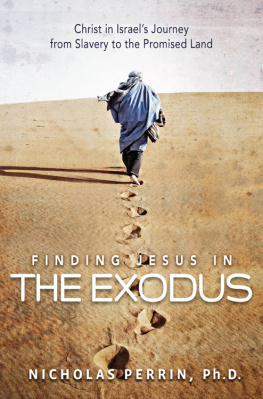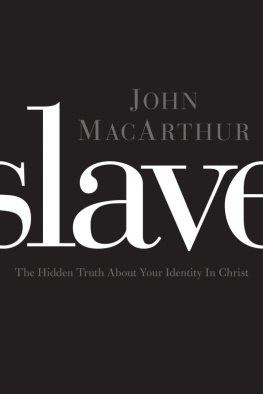A Better Freedom
Christ revealed himself to me
Enslaved my soul to set me free
I was bound to at him at Calvary
And found a better freedom
That Soul who suffered in the dark
Has purchased and unchained my heart
A shining slavery did impart
To find a better freedom
A better freedom cant be found
By those unwilling to be bound
A better freedom is not known
By those whose hearts will not be owned
But those who follow find a better freedom
We never can be truly free
Till were bound to this community
The Incarnation lets us see
A path to better freedom
A slave to sin, my heart before
Was bolted like a prison door
But in slavery to the Risen Lord
I found a better freedom
A better freedom cant be found
By those unwilling to be bound
A better freedom is not known
By those whose hearts will not be owned
But those who follow find a better freedom
Come with him and find a better freedom
Follow me and find a better freedom
Music and lyrics by Scott Roley and Michael Card
(Recording available for free download at michaelcard.com)
Appendix A
A Comparison of the Three Worlds of Slavery
Old Testament Slavery
- Slave of the L ORD was a title of honor (Moses, Joshua 14:7; Joshua, Judges 2:8; Abraham, Psalm 105:42; David, Psalm 89:3).
- Slavery was a part of the national identity (Exodus 13:3; 20:2; Leviticus 25:55).
- Slavery played only a minor role in the economic life of Israel. The norm seems to have been small-scale, indentured household slavery.
- Slaves were given the provision of sabbath rest (Exodus 20:10; Deuteronomy 5:14).
- The Law protected them from various types of abuse (Exodus 21:20-21; Deuteronomy 23:15-16).
- Hebrew slaves were to be released in the Jubilee year (Leviticus 25:39-43). (There is no record of the Jubilee ever being observed.)
- Indentured Hebrew slaves were released after six years (Exodus 21:1-11; Deuteronomy 15:12-18; see Jeremiah 34:8-17 for a violation of this law). Gentiles were slaves for life (Leviticus 25:44-46).
- A Hebrew slave could be redeemed by a kinsman redeemer or an alien (Leviticus 25:47-55).
- A Hebrew slave could redeem himself.
- After working off a debt, provision was made for the freed slave to make a fresh start with his own stock.
- The base price for a slave was thirty pieces of silver (Exodus 21:32).
- Special protection was extended to female slaves, protecting their marital status (Deuteronomy 21:10-14). Captured women could be taken as wives, not slaves. If divorced they could not become slaves.
- Slaves were protected from being killed by their masters (Exodus 21:20; Leviticus 24:17, 22).
- Special protection was mandated for runaway slaves (Deuteronomy 23:15).
- An injured slave was to be set free (Exodus 21:26).
- Slaves would not necessarily stand out by virtue of race or dress.
- In the history of Israel there was never a movement to abolish slavery.
- Slaves could choose to become slaves for life (Exodus 21:6).
Ways to Become a Slave
- Prisoner of war (Genesis 14:21; Numbers 31:9; Deuteronomy 20:14; 2 Kings 5:2)
- By purchase (Genesis 17:12; Ecclesiastes 2:7)
- By birth, houseborn slaves (Genesis 15:3; 17:12-13; Jeremiah 2:14)
- For restitution, as a means for a thief to make good on damages (Exodus 22:3)
- To pay off a debt (Exodus 21:2-6, 7-11; Deuteronomy 15:18; 2 Kings 4:1)
- Kidnapping, which was a capital offense (Exodus 21:16; Deuteronomy 24:7)
Ways to Freedom
- The Sabbatical Year (Exodus 21; Deuteronomy 15)
- Jubilee (Leviticus 25:13)
- A woman whose master refused marriage (Exodus 21:7-11)
- Purchase by a kinsman redeemer (Leviticus 25)
- As the result of an injury (Exodus 21:26-27)
Examples: Jacob, slave to Laban (Genesis 29:18); Joseph sold to Midianites (Genesis 37:36; 39:1); David enslaves Ammonites (2 Samuel 12:31); temple slaves (Joshua 9:3-27)
Slavery in the New Testament Era
- Slaves were despised. To call someone a slave was a serious insult. Cato the Elder wrote, He who has a slave has an enemy. See John 8:33.
- Slaves played a major role in the economic world. The Roman Empire was dependent on slavery.
- In general slaves had no rights. In the earlier Republic this was literally true. But in the time of the Empire, the New Testament era, some laws were written to give marginal protection, though they were often not enforced. Slaves could be killed or mutilated by their owners.
- Slaves left virtually no voice in the ancient records. We only have playwrights like Plautus and Petronius who caricature and ridicule slaves.
- Slaves were often manumitted or could even purchase their own freedom from their own savings (peculium). Exceptions were agricultural and mining slaves, who represent the vast majority of slaves, who were never freed.
- Slavery could present a chance for upward mobility. But this opportunity was limited to an extremely small percentage. It was better to be the slave of an influential person than to simply be free and poor.
- Education enhanced the value of a slave and so was encouraged among house slaves.
- Paternity among slaves was virtually never recognized.
- Prices for slaves varied widely. A doctor was worth fifty times a farm worker.
- Sexual abuse was common and taken for granted. Half of female slaves died before age thirty.
- Slaves could own property, even other slaves. But their possessions were still under the control of their masters, even if they became freedmen.
- Provision for the average slave was meager. Cato speaks of a new cloak and shoes every two years. Archeologists have never verified sleeping quarters for slaves.
- Runaways were frequent, an obsession in the ancient records. Roman law forbade the sheltering of runaways. Professional slave catchers captured fugitives. Runaway slaves were branded, mutilated and fitted with iron collars that were sometimes inscribed with the words, Capture me for I am fleeing.
- There was never a movement to abolish slavery, though there were several slave revolts, such as Spartacus in 73-71 B.C .
- Roman slavery was not race-based. Slaves were virtually indistinguishable by dress or race. (Exception: Some races were preferred for certain jobs, such as Gauls and Germanics for farming/mines and Greeks for more professional tasks.)
Sources for Slaves
- Captives in battle (The most just means, said Dionysius of Halicarnassus) and piracy
- Kidnapping
- Rescue of exposed infants
- Penal slaves
- International slave trade
- Reproduction
African American Slavery
It is difficult to generalize concerning American slavery since laws and regulations differed from state to state. Often plantations located next to each other treated slaves in radically different ways. For example, on one plantation slaves would be whipped for praying or singing while down the road others might be whipped for not attending church.
- Slaves were despised.
- Slavery was basic to the economy.
- Slaves were often given the sabbath to rest.
- Laws to protect them from abuse were usually ignored. They effectively had no rights.
- We have several eloquent voices preserved in slave literature and narratives, such as Frederick Douglass, Booker T. Washington and Olaudah Equiano.
- Slaves were sometimes manumitted, usually upon the death of their owners. There are a few rare examples of individuals purchasing their own freedom.


